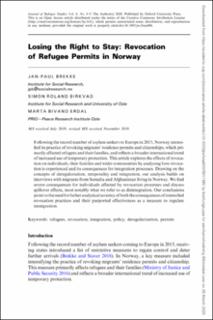Losing the Right to Stay: Revocation of Refugee Permits in Norway
| dc.contributor.author | Brekke, Jan-Paul | |
| dc.contributor.author | Birkvad, Simon Roland | |
| dc.contributor.author | Erdal, Marta Bivand | |
| dc.date.accessioned | 2020-03-27T06:28:47Z | |
| dc.date.available | 2020-03-27T06:28:47Z | |
| dc.date.created | 2020-03-26T18:13:43Z | |
| dc.date.issued | 2020 | |
| dc.identifier.citation | Journal of Refugee Studies. 2020, . | |
| dc.identifier.issn | 0951-6328 | |
| dc.identifier.uri | https://hdl.handle.net/11250/2648995 | |
| dc.description.abstract | Following the record number of asylum seekers to Europe in 2015, Norway intensified its practice of revoking migrants’ residence permits and citizenships, which primarily affected refugees and their families, and reflects a broader international trend of increased use of temporary protection. This article explores the effects of revocation on individuals, their families and wider communities by analysing how revocation is experienced and its consequences for integration processes. Drawing on the concepts of deregulariation, temporality and integration, our analysis builds on interviews with migrants from Somalia and Afghanistan living in Norway. We find severe consequences for individuals affected by revocation processes and discuss spillover effects, most notably what we refer to as disintegration. Our conclusions point to the need for futher analytical scrutiny of both the consequences of intensified revocation practices and their purported effectiveness as a measure to regulate immigration. | |
| dc.language.iso | eng | |
| dc.title | Losing the Right to Stay: Revocation of Refugee Permits in Norway | |
| dc.type | Peer reviewed | |
| dc.type | Journal article | |
| dc.description.version | publishedVersion | |
| dc.source.pagenumber | 20 | |
| dc.source.journal | Journal of Refugee Studies | |
| dc.identifier.doi | 10.1093/jrs/feaa006 | |
| dc.identifier.cristin | 1803776 | |
| cristin.ispublished | true | |
| cristin.fulltext | original | |
| cristin.qualitycode | 1 |
Tilhørende fil(er)
Denne innførselen finnes i følgende samling(er)
-
Tidsskriftpublikasjon [386]
Artikkel i tidsskrift -
Tidsskriftpublikasjon, fagartikler [19]
Kronikk, anmeldelse, fagartikkel og lignende registreres her.
